Are you addicted to being busy? Do you use busyness as a coping mechanism? Busyness addiction can seriously affect your life unless you learn how to slow down.
What is busyness addiction?
Our culture celebrates the art of being busy. The busier you are, the more successful and valuable you are. As we normalize being busy, we become obsessed with it. We try to get more things done in a shorter span of time and then jump onto other things that we can complete.
Being busy makes us feel better. It feeds our self-esteem and ego. And this is when we get addicted to it. However, busyness can actually be a sign of low self-esteem as we desperately try to validate ourselves and our worth through the act of being busy.
Busyness addiction is like any other addiction. We become physiologically and compulsively dependent on it. Michelle Braden, MSBCoach CEO, and author explains “Busy is habit-forming. People pride themselves on being busy, but busyness is an addiction that needs to be cured.”
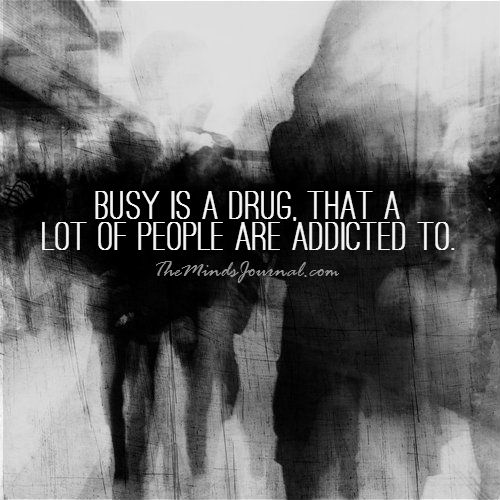
In a 2015 study titled The Disease of ‘Busyness’ lead researcher Kim Richards states that “Busyness is anything but impressive.” Richards found that “Our collective busyness has become an offensive disease.” However, when we learn to step back from the habit of being busy, we will be able to experience a “sense of peace, purpose, health, mindful leadership, and a good dose of meaning and self-respect.”
Related: 5 Tips For Busy People
Signs you have busyness addiction
Do you think you are addicted to being busy? Has busyness become a habit for you? Then here are a few signs that will help you identify your busyness addiction.
1. Your schedule is always full
When you are addicted to busyness, you will constantly find your calendar full of tasks and activities you need to complete. If you manage to find any empty space in your schedule, you will compulsively look for activities to fill it up with. When you don’t have anything to do, you will feel like you are unnecessarily wasting time.
You will feel that you could have used this time to accomplish something or engage in other activities. “They may feel most satisfied when they see their calendar is completely full,” explains Kristen Gardenhire, LCSW.
2. You are overly social
“Busyness can often cause people to become ‘social butterflies,’ and they may feel a constant need to go from social engagement to social engagement,” writes Kristen. If you have a busyness addiction then you will likely become increasingly social.
You will find yourself going out whenever you can manage the time and be around your friends, acquaintances, and coworkers. Busyness addicts have difficulty in spending time with themselves. If you don’t like being alone or spending time in solitude, then it is highly likely that you are obsessed with being busy.
3. Everyone says you’re busy
Do your loved ones tell you that you’re always busy? Do your family and friends complain that you have no time to spend with them? An obvious sign of becoming a busyness addict is when other people tell you that you seem too busy.
However, sometimes our loved ones may not want to criticize us or bother us when we are busy with our schedules. So it can be a good idea to ask your friends and family what they think about your busyness. This will help to gain a different perspective and enable you to realize how your busyness addiction is affecting others.
Related: 10 Little Habits That Are Keeping You Away From Happiness
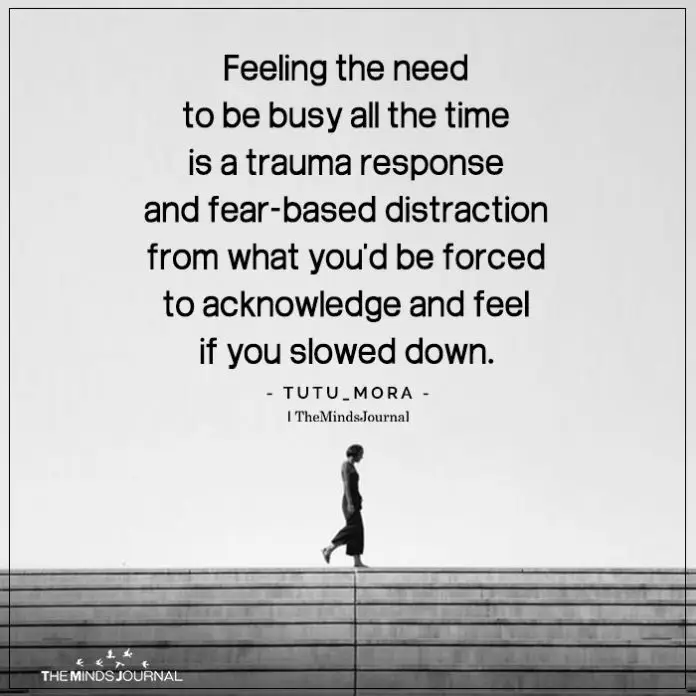
4. Slowing down is hard
Is the process of slowing down in life a real challenge for you? Then you just might be addicted to being busy. “That adage ‘stop and smell the roses’ may seem cliché, but it can be hard to do for those who can’t stop being busy,” explains counselor Kristen Gardenhire.
Busyness can make it hard for you to be more mindful about your day and focus on the smaller details of the present moment as you are always focused on getting the next task complete.
Overcoming busyness addiction
If you want to disconnect from your busyness addiction and connect with your emotions, then there are certain habits and practices that you need to start focusing on.
Here are a few ways you can learn to slow down.
1. Acknowledge your addiction
Acknowledge that you have an addiction to busyness. Admit that you jump from task to task, from project to project, and keep yourself constantly busy to avoid certain difficult emotions. Accept the fact that your busyness is an escape. Once you admit this, you can finally start the process of slowing down.
“In order to combat this mentality, it’s important to acknowledge this is a behavior you see in yourself,” writes Kristen Gardenhire, LCSW.
2. Follow a morning routine
Wake up a bit earlier than you are used to and set out some time for a morning ritual that allows you to ground yourself. Make sure to make this time completely technology-free.
Your morning routine may include grounding activities like walking bare feet, working out, yoga, mindfulness meditation, gardening, writing, praying, or something as simple as enjoying your coffee. This will enable you to enjoy the present moment and get in touch with yourself.
Related: The Art Of Grounding: 7 Healing Benefits Of Walking Barefoot Outside
3. Improve your awareness
Throughout the day, try to be more mindful and pay attention to your thoughts, emotions and physical sensations, especially during the transitional moments. These are the moments that allow you to catch your breath and reflect, even if for a little while. Be aware of your breathing. Be aware of your body. Be aware of your mind.
Crystal adds “Notice your internal narrative during these transitions, especially when you want to get quickly to the next thing. Challenge yourself to simply be where you are, even when you are ‘in between’ things on your to-do list.”
4. Take breaks
Make sure to take 5-minute breaks every hour. Set a reminder on your smartphone and use this time to get your body moving. Talk a quick walk around your workspace or take a walk outside or do some dynamic movements synchronized with your breathing.
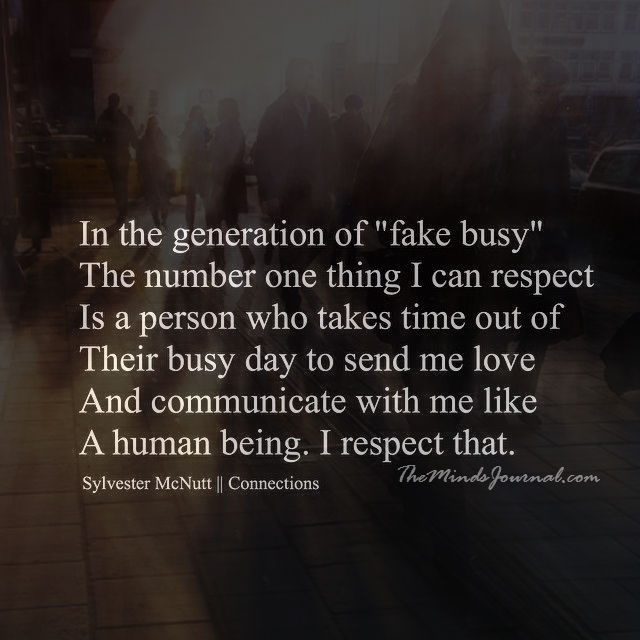
5. Breathe
During your 5 minute hourly breaks, utilize the final one minute to focus on your breathing. Sit down and breathe deeply through your nose. Simple deep breathing exercises can help you become more mindful and overcome your busyness addiction.
When you practice deep nasal breathing, “you send a message to your body that everything is OK. Then go back to work attuned, refreshed, and more attentive,” adds Crystal McCreary.
6. Eat mindfully
Every time you eat something, make sure to eat mindfully. Whether you are having breakfast, lunch, dinner, or even snacks. Simply enjoy the food you are eating and be aware of the flavors, textures, smell, and taste. Notice how the food feels against your tongue.
“Try not to multi-task during this meal. Put your fork or spoon down between bites. Savor and chew your food completely before swallowing,” explains New York-based wellness specialist Crystal McCreary.
Related: Mindful Eating: Breaking the Emotional Cycle
7. Manage time for reflection
Find some time each day, preferably before bed, to calmly reflect on your day. You can also choose to write a journal as it can help you get clarification on a lot of unsolved issues.
Choose to forgive others and yourself and let all the negative experiences from the day simply pass with time. Focus on starting the next day with a new approach.
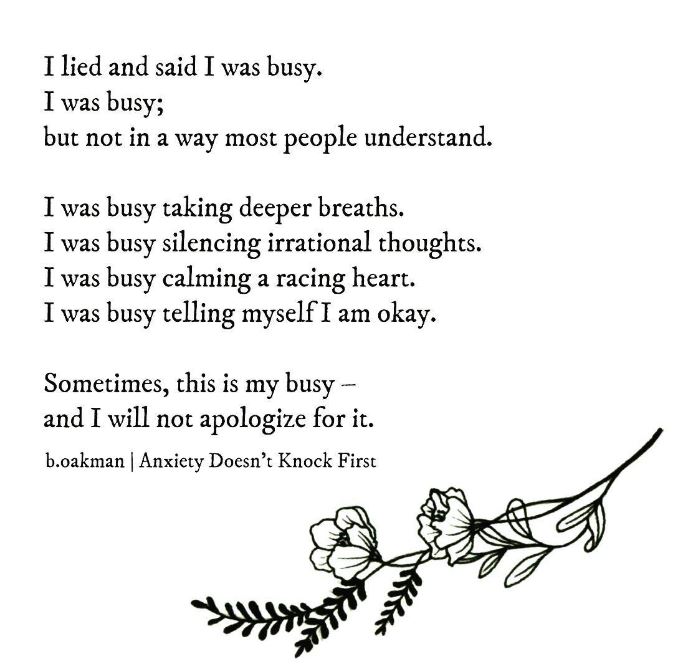
8. Relax
Practice different muscle relaxation techniques before bed as it will help you slow down mentally and physically and get some good sleep. Yoga instructor Crystal McCreary suggests “Actively tighten your muscles and then relax them, starting from your feet and make your way to your face. Take deep breaths along the way.”
9. Seek help
If you think your busyness addiction is getting out of hand, then it can be wise to seek help from a mental health professional. A professional therapist can equip you with the necessary tools to overcome your disease of being busy.
Busyness is a coping mechanism
The more you try to keep yourself busy, the harder you are trying to avoid the present. When we are not happy with our reality or not satisfied internally, we tend to stay busy. This helps us to keep our minds off the things that bother us. Things that cause us stress, anxiety, and emotional pain.
“We use busyness as a distraction from painful feelings,” writes psychologist Nick Wignall. He adds “When your to-do list is constantly throwing appointment after appointment at you, task after task, meeting after meeting, you don’t have the space to catch your breath much less reflect on seriously painful lingering emotions.”
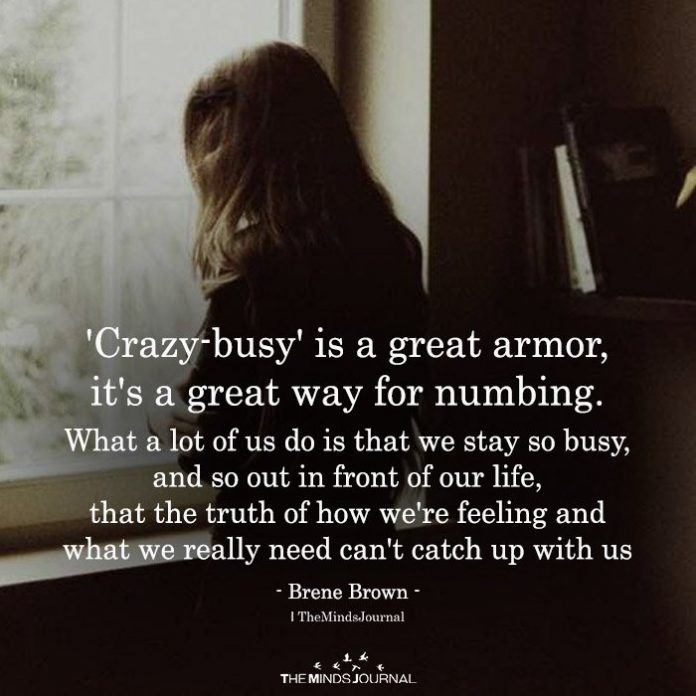
Hence, it is nothing but a coping mechanism that we use to avoid our innermost emotions. Although it may seem to be an effective strategy in the short run, this can be seriously mentally and emotionally damaging in the long term.
Brené Brown Ph.D., LMSW, research professor and author, explains “One of the most universal numbing strategies is what I call ‘crazy busy;’ We are a culture of people who’ve bought into the idea that if we stay busy enough, the truth of our lives won’t catch up with us.”
By staying busy, we try to mask some difficult truths in our lives that we are afraid of facing. Our busyness addiction helps to numb our thoughts and emotions so that we can avoid our own reality.
However, this is not the best way to approach a problem in our lives. “Be honest with yourself,” suggests mind-body medicine physician and New York Times bestselling author Lissa Rankin, M.D. She adds “What might you be hiding behind your “to do” list? How might you care for and feed your spirit more so you’re not so inclined to fill the void with busyness?”
Instead, we must focus on trying to find peace by slowing down.
Related: 20 Signs You’re Experiencing Soul Loss
The busyness problem
Being busy all the time may not appear that much harmful. You are just getting your work done, accomplishing your tasks, and following your schedule. It’s true there is nothing wrong with that. But when you use busyness to run away from something, especially yourself and your emotions, then it can be a huge problem.
“Research on workaholism and adrenaline addiction suggests that, much like an addictive drug, adrenaline can produce pleasurable somatic sensations and create a dependency in some overworked persons,” explains yoga and mindfulness educator Crystal McCreary. Busyness addiction tends to creep in slowly and sneakily.
At first, it mesmerizes us with the thrill of accomplishments, being valued, and joy. You feel as if you are finally being rewarded for all the hard work you’ve put in through the years. However, the thrill of accomplishment is soon replaced with stress, anxiety, and burnout.
“When you are not aware of it, busyness can take over in ways that may be similar to how an addiction can and prevent you from being present in your own life with those around you,” writes mental health counselor Kristen Gardenhire, LCSW.
Slow down and live in the moment
When you identify your busyness addiction and work on slowing down, you are not only able to build a happier and healthier lifestyle, you can also build a stronger relationship with yourself and others.
Make some space for yourself throughout the day, pause for a moment, and just breathe. You will realize what the true human experience feels like.
Here is an interesting video that you may find helpful:
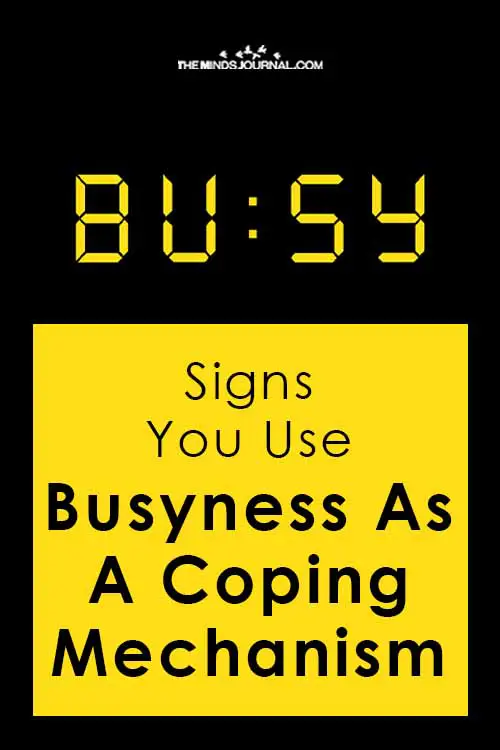

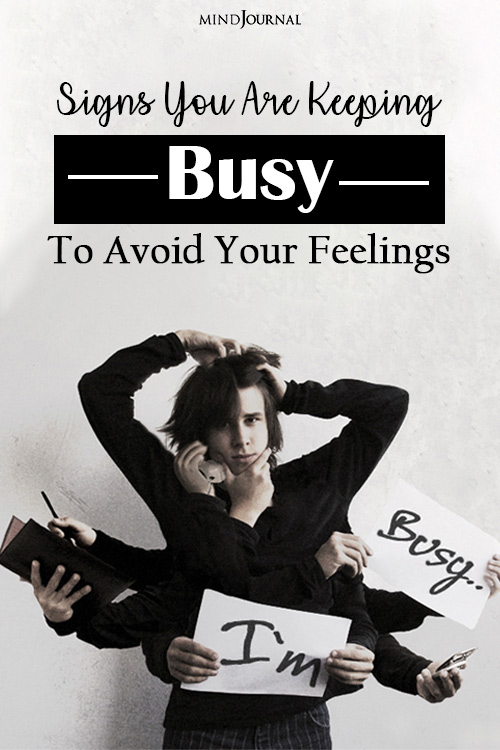







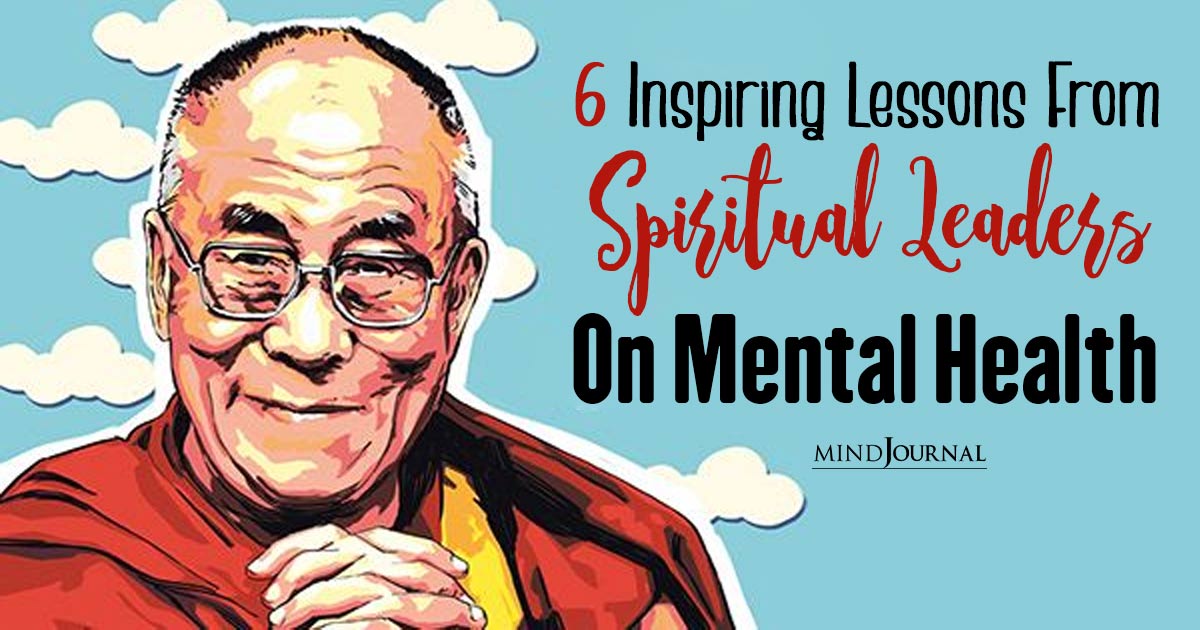
Leave a Reply
You must be logged in to post a comment.